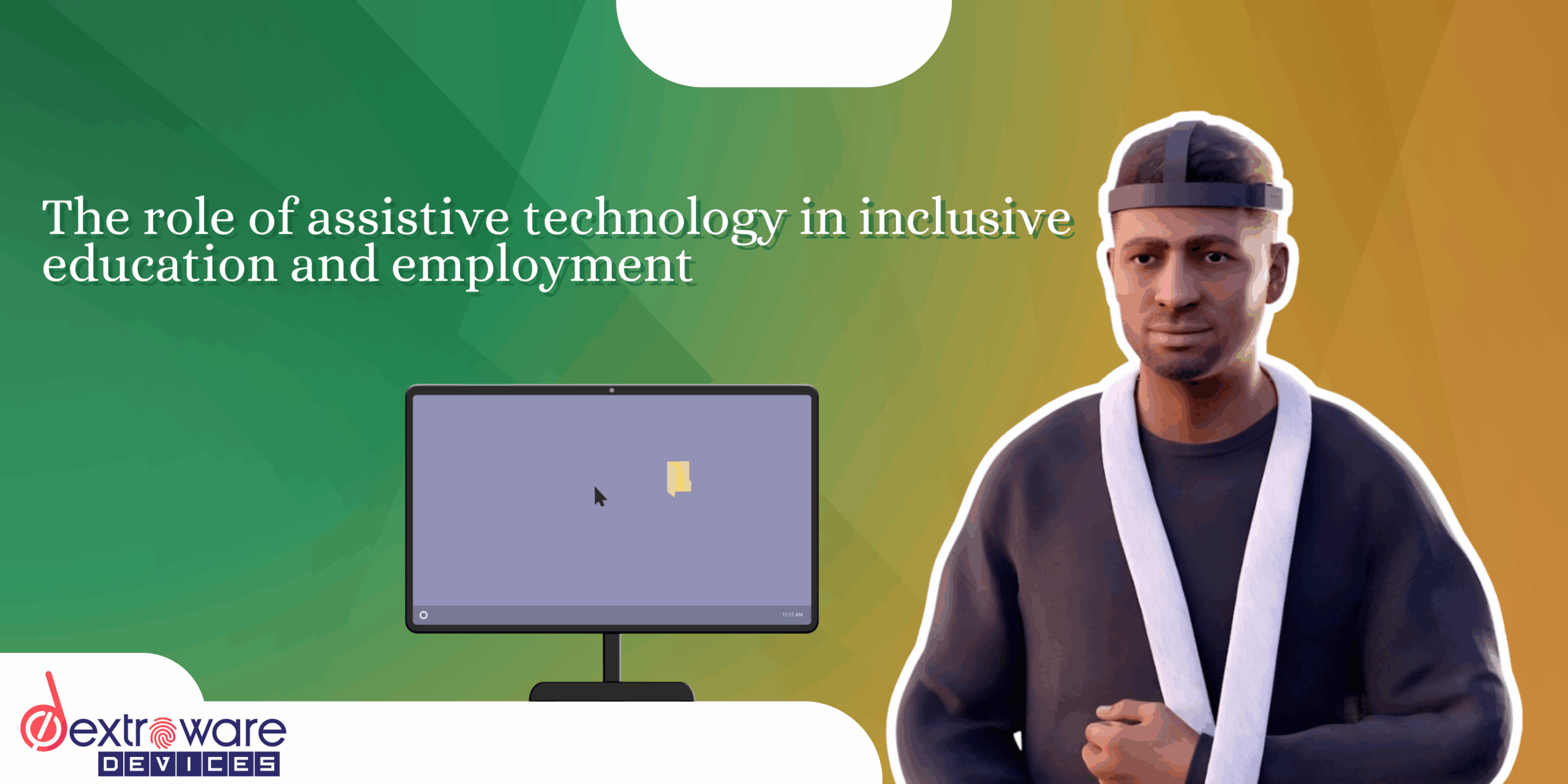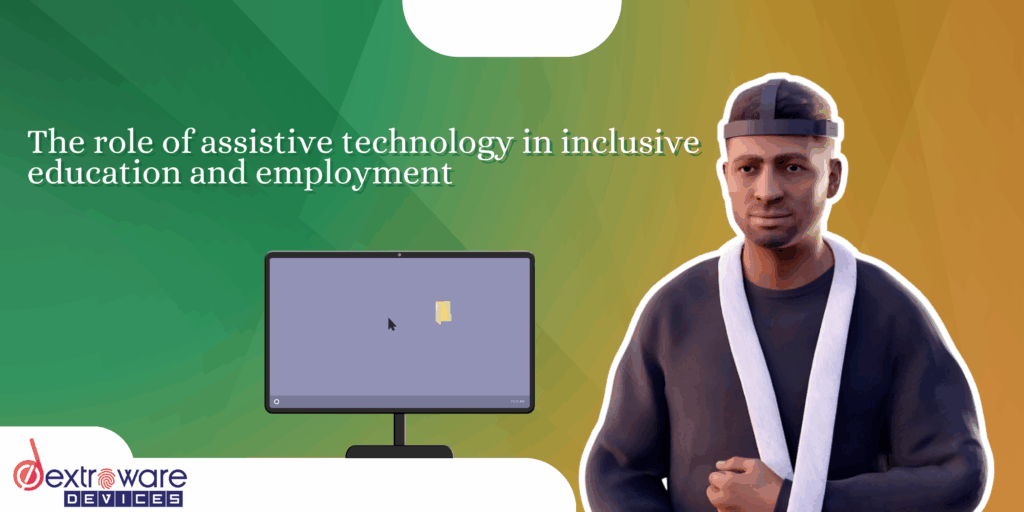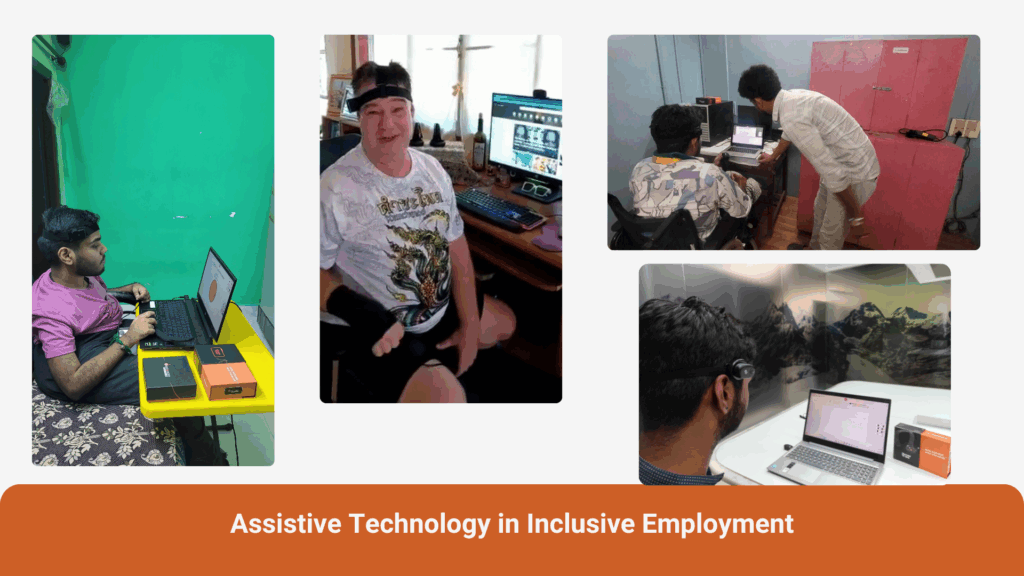

Assistive technology (AT) has revolutionized the way individuals with disabilities access education and employment. By providing tools that support communication, mobility, and learning, AT fosters inclusivity, ensuring that everyone, regardless of their physical or cognitive limitations, can participate in society on equal terms. This blog explores the significance of assistive technology in education and employment, highlighting its impact, challenges, and the way forward, with a special focus on the Mouseware.

Assistive technology helps students with disabilities overcome barriers to learning. For example:
● Input devices such as adaptive keyboards, eye-tracking systems, and switch-controlled devices facilitate interaction with digital platforms.
● Mouseware is an innovative assistive device designed to help individuals with limited hand mobility control a computer using head movements. This technology enhances accessibility, particularly for students with motor impairments, allowing them to navigate digital platforms, engage in learning, and interact with technology more independently.
● The device tracks head movements and translates them into cursor movements on the screen.
● It eliminates the need for traditional mouse or touchpad controls, making it ideal for those with physical disabilities.
● With customizable settings, users can adjust the sensitivity and response to match their comfort level
2. Improving Communication
Students with speech impairments benefit from Augmentative and Alternative communication (AAC) devices like:
● Text-to-speech software that converts written words into spoken language.
● Speech-generating devices (SGDs) that allow non-verbal students to communicate effectively.
● Sign language apps that help hearing-impaired students engage in conversations.
3. Supporting Cognitive and Organizational Skills
Mouseware also supports learning by enhancing focus and reducing distractions:
● Custom Button Mapping: Reassign buttons for actions like copy, paste, back, or forward—ideal for productivity.
● Sensitivity Adjustment: Customize cursor speed (DPI settings) for specific tasks like browsing, design, or gaming.
● Macro Creation: Automate repetitive tasks with macros, increasing efficiency.

1. Creating an Accessible Work Environment
Assistive technology plays a crucial role in making workplaces more inclusive by:
● The Mouseware is an advanced assistive technology designed to help employees with motor disabilities navigate computers effortlessly using head movements. By eliminating the need for a traditional mouse or touchpad, it enables individuals with limited hand mobility to perform office tasks with greater ease and independence.
How Mouseware Enhances Workplace Accessibility & Efficiency
Promotes Inclusive Workspaces – Helps organizations support diversity and inclusion by providing equal access to digital tools for employees with disabilities.
2. Facilitating Remote Work and Digital Inclusion
With the rise of remote work, AT ensures that employees with disabilities can work efficiently from anywhere. Features such as:
● The Mouseware is a powerful assistive tech device designed to empower employees with mobility impairments, allowing them to work comfortably from home or office setups. By replacing traditional input devices with head-movement-based navigation, Mouseware ensures smooth and efficient interaction with digital platforms, making work more accessible and inclusive.
● Seamless Digital Interaction – Compatible with various office applications, communication tools, and software enabling users to perform daily tasks such as typing emails, attending virtual meetings, and managing documents with ease.
● Increased Comfort & Productivity – Reduces physical strain and fatigue, allowing employees to work for longer hours without discomfort.
● Flexible Work Adaptation – Whether working from a corporate office, home workspace, or hybrid setup, Mouseware ensures a consistent and hassle-free experience across different environments.
● Fosters Workplace Inclusion – Organizations can create a more accessible and diverse work culture by integrating Mouseware, ensuring that employees with mobility impairments can fully participate in digital workflows.
Many assistive technologies help individuals maintain competitive employment by:
● The Mouseware is an innovative assistive technology device that significantly improves efficiency by allowing users to control computers hands-free through head movements. Designed for individuals with mobility impairments, ergonomic needs, or those seeking a more intuitive way to interact with digital devices, Mouseware makes digital tasks more manageable, faster, and more accessible.
● Speeds Up Workflow – By offering an intuitive and responsive way to navigate computers, Mouseware helps users’ complete tasks such as document editing, communication, and online research more efficiently.
● Ideal for Various Users - Beneficial for individuals who face challenges using their hands or fingers, remote workers, and professionals who need a hands-free approach to computing.
● Adaptive learning platforms that provide training opportunities.
● Customizable accessibility settings in mainstream applications, ensuring ease of use.

1. Cost and Affordability
Many assistive technologies are expensive, limiting accessibility for individuals and institutions. However, the Mouseware offers a more affordable alternative compared to other assistive technologies, making it a cost-effective solution for individuals with disabilities. More efforts are needed to promote such budget-friendly innovations and establish funding programs to enhance accessibility further.

Despite advancements, many educators and employers are unaware of the full potential of AT. Providing training and awareness programs can bridge this gap. The Mouseware stands out by offering effective training to users, ensuring they can seamlessly integrate the technology into their daily activities and maximize its benefits.
3. Integration with Mainstream Technology

Future developments should focus on seamlessly integrating assistive tools with commonly used software and platforms to create a truly inclusive digital environment. The Mouseware is designed for easy integration with various digital platforms, ensuring users can quickly adapt and utilize its capabilities without complex setup or modifications.
Conclusion:
Assistive technology is a powerful enabler of inclusion in education and employment. By breaking down barriers, it allows individuals with disabilities to thrive in academic and professional settings. The Mouseware exemplifies how cutting-edge assistive technology can enhance accessibility, empowering individuals with mobility impairments. As technology advances, ongoing efforts in affordability, awareness, and integration will be key to fostering an inclusive society where everyone has equal opportunities to learn and work.